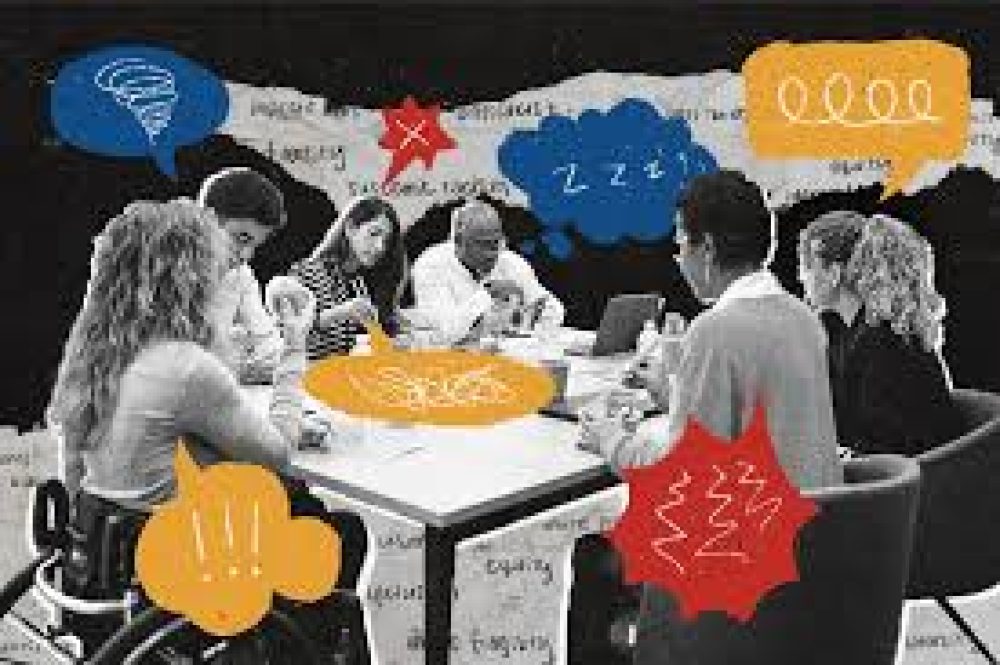
Does DEI training discriminate against White people? Courts will decide.
by Summer August 6, 2024 0 commentsBy: Summer
Share your thoughts in the comments!!!
Source: https://www.washingtonpost.com/business/2024/08/09/dei-training-court-cases-discrimination/
Joshua Young, a corrections officer in the Colorado prison system, was shocked by the lessons of the anti-bias training session he was required to attend in March 2021. With its references to “white supremacy,” “white exceptionalism” and “white fragility,” the training sent a clear and disturbing message to his mind: All White people are racist.
“I thought the training was potentially harmful to our staff relationships, relationships between staff and offenders, and undermined us in so many ways,” Young, 47, said in an interview. “It told us basically that … we were unable to treat people fairly just because of the way they look.”
So Young sued, becoming one of more than a half dozen White plaintiffs alleging that workplace bias training violated their civil rights. The cases are part of a broader legal and political backlash that has targeted an array of DEI programs, from corporate fellowships to state and federal programs aimed at ensuring that women and racial minorities have access to jobs, government contracts, and other benefits.
As the legal battle intensifies, DEI training is coming under special scrutiny, with at least seven court cases pending nationwide alleging that it constitutes workplace discrimination. Some practitioners have responded by voluntarily dialing down aspects of their “anti-racist” curriculums — increasingly in demand since the murder of George Floyd in 2020 — which critics say go beyond traditional efforts to awaken White people to their inherent biases and instead paint them as inherently racist.
In his lawsuit, for example, Young claimed that mandatory anti-racism training in the Colorado prison system fomented a “hostile” workplace for White employees. Though the U.S. Court of Appeals for the 10th Circuit dismissed the suit, a three-judge panel found the training “troubling on many levels,” saying its “ideological messaging” and “race-based rhetoric is well on the way” to constituting harassment.
In what legal experts have called a blueprint for future challenges, the majority said Young failed to demonstrate that the harassment was “severe and pervasive.” So Young refiled his lawsuit in June, alleging that the training made his job more difficult and strained his relationships with co-workers who agreed with the lessons.
“There hasn’t been that much attention paid in the trainings to how much the trainings themselves vilify dominant groups,” said Kenji Yoshino, director of New York University’s Meltzer Center for Diversity, Inclusion, and Belonging, who called the volume of cases challenging such efforts “unprecedented.”
Trainings that examine racism and unconscious bias can be helpful tools, Yoshino said, but they can cross into illegal harassment if they perpetuate negative stereotypes.
“Many unconscious bias trainings are totally appropriate and don’t need to be changed at all because the enemy is not White men,” he said. “The enemy is bias against racial minorities or really bias against any group.”
From ‘anti-bias’ to ‘anti-racism’
Before Floyd’s death, unconscious bias training was a fixture in corporate DEI programs, which had been in place since the early 1960s to combat bigotry and comply with new federal laws prohibiting discrimination in the workplace. By 1976, more than 60 percent of America’s largest companies had their managers undergo unconscious bias training, according to a March paper by Frank Dobbin, a sociologist at Harvard University who researches DEI programs.
For years, the curriculum typically emphasized that everyone holds biases and that there are legal risks to not addressing them. But after Floyd, companies increasingly adopted “anti-racism” training, which advanced the idea that racial prejudice is pervasive in American society, including in the workplace, and provided lessons on how to challenge it.
Pam McElvane, chief executive of Diversity MBA, a consultancy that tracks how companies apply DEI programs, said so few companies had implemented anti-racism training before 2020 that she did not track its use. In 2016, 90 percent of the roughly 460 companies she monitors offered primarily unconscious bias, cultural competence, and sensitivity training.
Since then, she said, DEI training has become more prevalent, spreading to 98 percent of those companies. These companies span 28 industries—including retail, banking, and telecommunications—and collect from $6 billion to $27 billion a year in revenue.
But there has also been a palpable shift in strategy, her data shows. A year after Floyd’s murder, 85 percent of the companies had implemented anti-racism training, which emphasizes racism, sexism, white supremacy, classism, privilege, stereotypes, and systemic discrimination. Only 71 percent offered unconscious bias training in 2021.
Though unconscious bias training and anti-racism training share common characteristics, the latter delves into lessons about the nation’s history of slavery, segregation, and discrimination while advancing the idea that society continues to favor White people. The goal is to create awareness about systemic racial inequities, McElvane said.
But legal experts say the training runs the risk of singling out White participants and painting them as inherently racist — in contrast to unconscious bias training, which typically highlights the personal biases everyone holds.
This year, 81 percent of those companies initiated anti-racism seminars, and only 54 percent enacted unconscious bias training.
It remains unclear whether any version of the training works.
Dobbin’s research found that unconscious bias training has been largely ineffective in diversifying workforces, even as it remains central to corporate diversity efforts. The problem, he argues, is that it often shames people and puts undue attention on past incidents that led to discrimination, which some workers might find intimidating. The approaches can repel employees and be counterproductive, he said.
A similar dynamic applies to the newer “anti-racism” training, he said, adding that trying to convince people that they harbor racial biases and need to change is a losing battle. “We know that people just don’t respond very positively to that message, even if its message is 100 percent correct,” he said in an interview.
McElvane disagreed, arguing that companies that see poor results have mismanaged their training.
Negative reactions are “not prevalent, so it’s not fair to say that it is,” she said. “When an environment is polarized, you need to meet people where they are, so they don’t feel attacked.”
Heightened scrutiny
Whatever the case, many plaintiffs in the recent tide of DEI lawsuits contend that certain DEI trainings stoke workplace tensions and unfairly single out White people.
Of the 59 ongoing cases across the country, six challenge the legality of the training, according to a database compiled by the NYU Meltzer Center. Though some have failed to gain traction—a case against Honeywell was recently dismissed—others are shaping what employers can include in training. Legal experts point to a recent ruling involving Penn State Abington, a Penn State satellite campus just north of Philadelphia.
The case was filed by English professor Zack De Piero, who claims he was discriminated against for being White. In August 2020, De Piero says he was required to watch a presentation captioned “White teachers are the problem.” During a breathing exercise the same year, De Piero claims White and other non-Black faculty were told to hold their breath longer than Black faculty members so they could “feel the pain.”
“It makes you feel like you’re just being asked to sit there and take it,” De Piero said in an interview with The Washington Post. “They’re not giving you a way out.”
In January, a federal judge in Pennsylvania allowed De Piero’s claim to proceed, writing the training “discussed racial issues in essentialist and deterministic terms — ascribing negative traits to white people or white teachers without exception and as flowing inevitably from their race.” Yoshino, the NYU professor, said the early ruling could serve as a guide for what training should not do: negatively stereotype specific groups, such as White men.
The trickier part, Yoshino said, is that simply teaching the country’s history of slavery and discrimination runs the risk of making White people “feel bad” and therefore discriminated against. But it’s possible to talk about that history, he said, without saying, “White people are somehow inherently wrong or evil.”
The judge in the case, Obama appointee Wendy Beetlestone, seemed to agree, writing that discussing “the influence of racism on our society does not necessarily violate federal law.”
“Training on concepts such as ‘white privilege,’ ‘white fragility,’ implicit bias, or critical race theory can contribute positively to nuanced, important conversations about how to form a healthy and inclusive working environment,” she wrote. “Indeed, this is particularly so in an educational institution.”
Many of the cases challenging anti-racism training are backed by conservative groups that say DEI, in general, has no place in the workplace, schools, or government. In 2020, President Donald Trump foreshadowed those efforts when he signed an executive order barring federal agencies and recipients of federal funding from conducting anti-bias training—a move President Joe Biden later reversed.
DEI proponents have scored other victories: In March, the U.S. Court of Appeals for the 11th Circuit overturned a 2022 Florida law that banned discussion of diversity and race in private workplaces, finding it violated the free speech rights of businesses. Last month, a three-judge panel on the U.S. Court of Appeals for the 7th Circuit upheld the dismissal of a lawsuit brought by a White Honeywell employee who alleged he was unfairly fired for refusing to take the company’s unconscious bias training.
Evolving under pressure
As the battle plays out in court, some DEI training practitioners are moderating their messages.
Robin DiAngelo, a DEI trainer and the author of the best-selling book “White Fragility,” said some have been “tweaking their strategies” to emphasize “inclusion” rather than systemic racism, making the case that “everybody has a stake in a more inclusive society.”
Though DiAngelo hasn’t changed the core of her training, she said in an interview that she finds herself making “more preemptive statements” when she starts sessions, such as: “This is just a framework. This is not brainwashing. How you see the world and what you believe is yours. All I’m asking you to do is try this on.”
“There will be no growth if I don’t have some discomfort,” DiAngelo said, although she added that effective trainers can minimize defensive responses.
McElvane, the DEI consultant, said companies’ legal departments are increasingly vetting diversity training and may advise against using terms that stereotype White people. Companies invite lawsuits, she said, when anti-racism training is implemented in isolation without integrating concepts of inclusiveness.
The White men who pushed back in instances in which they’re stereotyped as being racist, she said, “had a good reason to feel excluded.”






No Comments so far
Jump into a conversationNo Comments Yet!
You can be the one to start a conversation.Only registered users can comment.